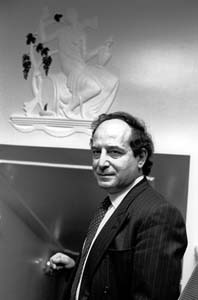Roberto Calasso
| Roberto Calasso | |
|---|---|

Roberto Calasso, 1991, by Erling Mandelmann
|
|
| Born |
30 May 1941 Florence, Italy |
| Language | Italian |
| Nationality | Italian |
Roberto Calasso (born 30 May 1941 in Florence) is an Italian writer and publisher. Apart from his mother tongue, Italian, Calasso is fluent in French, English, Spanish, German. Latin and Greek. He has also studied Sanskrit. He has been called 'a literary institution of one'. The fundamental thematic concept of his oeuvre is the relationship between myth and the emergence of modern consciousness.
Calasso was born in 1941, into a family of the Tuscan upper class, well connected with some of the great Italian intellectuals of their time. His maternal grandfather Ernesto Codignola was a professor of philosophy at Florence University. Codignola created a new publishing house called La Nuova Italia, in Florence, as his friend Benedetto Croce had done in Bari with Laterza. Calasso's uncle Tristano Codignola, was a partisan during World War II who after the war joined the political life of the new republic, and was for a while Minister of Education. His mother Melisenda – who gave up an academic career to raise her three children – was a scholar of German literature, working on Hölderlin’s translations of the Greek poet Pindar. His father Francesco was a law professor, first at Florence University and then in Rome, where he eventually became dean of his faculty. He was arrested by the fascist militia after the assassination of Giovanni Gentile and sentenced to be killed in reprisal, but was saved by the intervention of both friends of Gentile, with whom the family had connections on the maternal side, and by the German consul Gerhard Wolf.
At 12 he met and was greatly influenced by a professor at Padua University, Enzo Turolla, and they became lifelong friends. In 1954 the family moved to Rome, where he developed a passion for cinema. His doctoral dissertation was Sir Thomas Browne's theory of hieroglyphs, which he completed under Mario Praz, while indulging himself with hashish.
Calasso has worked for the publishing firm of Adelphi Edizioni since its founding by Roberto Bazlen in 1962 and became its Chairman in 1999. His books have been translated into most European languages.
He is the author of an unnamed ongoing work reflecting on the culture of modernity which began with The Ruin of Kasch in 1983, a book admired by Italo Calvino. Dedicated to the French statesman Talleyrand, it was followed in 1988 by The Marriage of Cadmus and Harmony, in which the tale of Cadmus and his wife Harmonia becomes a pretext for re-telling the great tales of Greek mythology and reflecting on the reception of Greek culture for a contemporary readership. Another world civilization is surveyed in Ka (1996, where the subject of the re-telling is Hindu mythology). K restricts the focus to a single author, Franz Kafka; this trend continues with Il rosa Tiepolo, inspired by an adjective used by Proust to describe a shade of pink used by Tiepolo in his paintings. With La folie Baudelaire, Calasso once more broadens his scope to fresco a whole civilisation, that of Paris in the latter half of the 19th century, reconsidering the lives and works of the post-romantic generation of writers and artists from Baudelaire to Valéry. In his most recent work, Ardore (2010), the author returns to India for an exhaustive analysis of the theory and practice of Vedic sacrifice and its significance for post-modern epistemology.
...
Wikipedia
